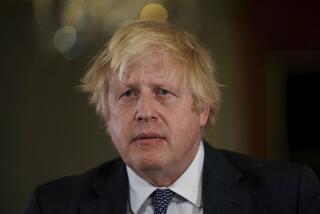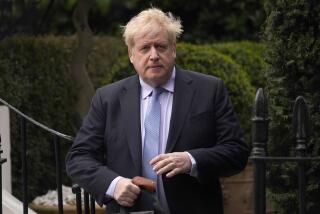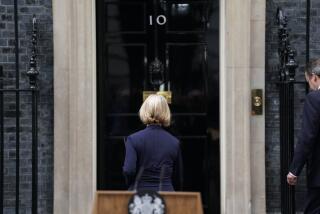Report Assails Thatcher Over Copter Dispute
LONDON â A parliamentary report that questioned the truthfulness of Prime Minister Margaret Thatcher and denounced actions of her senior aides during a controversy over a rescue package for an ailing helicopter manufacturer plunged her government into another political storm Thursday.
The report came as Thatcher was already dogged by her increasingly controversial South Africa policy, her combative, unsympathetic personal image and a series of domestic woes that refuse to go away.
Thursdayâs report from the House of Commons Defense Committee, where members of Thatcherâs party hold a majority, stopped short of calling the prime minister a liar in her statements on the controversial âWestland Affair,â as it is called. But the report said that some of her explanations âlook flimsy, to say the least.â
Opposition Labor Party committee member John Gilbert said in an interview, âThese words âflimsy to say the leastâ--thatâs parliamentary language for saying we donât believe a word of it.â
Former Trade and Industry Secretary Leon Brittan, whom Thatcher staunchly defended until he was forced to resign over the affair, was linked in the report directly to activities described as âdisreputableâ and âimproper,â while two trusted Thatcher aides were accused of deceit in withholding key information.
The damning report resurrected an affair that began last October as a seemingly trivial Cabinet dispute about how best to rescue Westland PLC, an ailing manufacturer of helicopters.
Before the dispute ended, Thatcher had lost two senior ministers and seen her own integrity challenged in what became the most serious domestic crisis of her seven-year premiership.
The report reviewed the government reaction to Westlandâs financial difficulties and the eventual Cabinet battle between Thatcher, Brittan and others on one side, advocating a takeover by United Technologies Corp., an American company, and on the other side by backers of a rival European consortium bid promoted mainly by then-Defense Secretary Michael Heseltine.
Glimpse of Decision-Making
The report criticized the actions of both Brittan and Heseltine and presented a rare glimpse of Cabinet decision-making and the petty feuding that in this instance surrounded it.
But the report reserved its harshest judgment for a decision to leak portions of a confidential letter from the countryâs third-ranking legal adviser, Solicitor General Patrick Mayhew, to Heseltine, complaining of material inaccuracies in Heseltineâs public statements on the debate.
âThe method of disclosure that was adopted, the unattributable communication of tendentious extracts from the letter, was disreputable,â the report concluded. It described the leak as âan outrageous way in which to treat (Mayhew)â and found that the only purpose for the leak was to discredit Heseltine.
The leak was traced to two of Thatcherâs closest aides and to senior officials in the Department of Trade and Industry. Brittan resigned after it became clear that he authorized the leak. Heseltine had earlier resigned as Cabinet opposition to his position mounted, and he complained publicly of Thatcherâs strong-arm tactics.
The unauthorized disclosure of government documents by civil servants is viewed here as an extremely serious act, punishable by imprisonment. Disclosure of the existence, let alone the contents, of a letter between a senior law officer and a Cabinet minister is a major breach of government procedure.
Thatcher Not Involved
Although it found that Thatcher was not personally involved in the leak, the committee appeared unconvinced by her later explanations that it was necessary to publicize Heseltineâs inaccuracies so Westlandâs chairman would be aware of them before holding a news conference later the same day.
âSince the information was passed by telephone to Westland in any event, the reason given by the prime minister for releasing the information . . . begins to look flimsy, to say the least,â the report said.
Thatcherâs press secretary and close aide, Bernard Ingham, her personal private secretary, Charles Powell, and the head of the countryâs civil service, Robert Armstrong, were all accused of failing to inform Thatcher promptly of details of the leak known to them but only presented to Thatcher two weeks later, together with the results of an internal investigation that she had ordered.
The committee found the absence of any disciplinary action against the officials âextraordinary.â
Disclosures that a prime minister noted for a no-nonsense approach to business was suddenly surrounded by a clumsy attempt to cover up a government leak seriously damaged Thatcher.
Thatcherâs Dominance Eroded
Some argue that subsequent events have proven that her personal dominance, especially within the Cabinet, was severely eroded by the affair.
No one here believes the Defense Committee findings pose an immediate danger to Thatcherâs hold on the government. She enjoys a comfortable majority of 136 seats in the 650-seat House of Commons, so only a major revolt within her party could do that. But recent opinion polls suggest that fewer than a third of Britainâs voters would back her Conservative Party if an election were held today.
However, the report is likely to deepen the stain on her personal image, possibly cost her the services of key assistants and add to the difficulties of the Conservative Party hierarchy in the initial stages of planning her reelection campaign, which must take place before mid-1988.
Facing a barrage of questions from political opponents at Thursdayâs question time in the House of Commons, Thatcher promised to reply to the report, expressed confidence in her aides and said there was no discussion of any action against them.
But for long periods, she was overwhelmed by opposition shouting, and veteran parliamentary observers described her performance as one of the worst in years.
Opposition Warning
An exasperated Labor Party leader, Neil Kinnock, interrupted Thatcher at one point, shouting, âYou are in great danger of yourself attracting the reputation of being disreputable and improper.â
David Owen, leader of the Social Democrats, demanded disciplinary procedures against those found to have acted improperly.
The Westland report landed on top of other problems now plaguing Thatcher.
Her hard line in opposing substantial economic sanctions against South Africa has embroiled her in controversy and generated growing domestic opposition.
A decision by many nations to boycott the Commonwealth Games to protest her policy created such anger in the host city, Edinburgh, that the cityâs governing council voted Wednesday to withdraw her invitation to the opening ceremonies, held Thursday.
Queen is Upset
Thatcherâs tough stance is also widely perceived to have upset Queen Elizabeth II, whose work to foster Commonwealth unity has formed the centerpiece of her 34-year reign.
Although the queen has few constitutional powers, she is an extremely popular monarch, and the public perception of Thatcher confronting her head-on is a potentially dangerous political liability.
Thatcherâs unyielding stand on the South Africa issue has exacerbated what political analysts believe to be her single biggest drawback: an image of not caring enough for the weaker sectors of society.
Her governmentâs inability to reduce record high unemployment, seemingly stuck at over 13%, coupled with deteriorating health services and a demoralized public education system have all helped generate this image.
More to Read
Sign up for Essential California
The most important California stories and recommendations in your inbox every morning.
You may occasionally receive promotional content from the Los Angeles Times.










